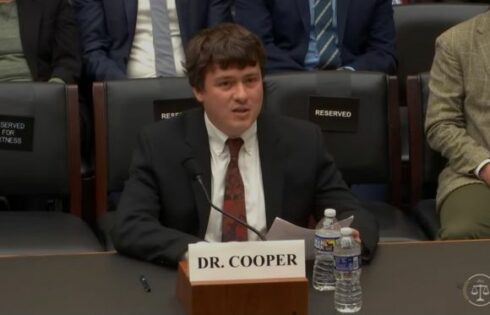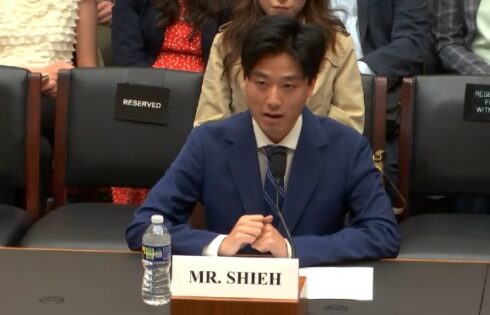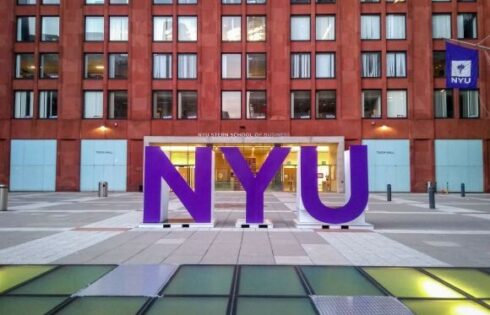A group of gay and straight students at Catholic University of America engaged in efforts to be recognized as an official campus club have been met with difficulty from administrators and skepticism from some students, who say they believe the club is not a good fit for the school.
As university officials deliberate whether to recognize the gay student group, called CUAllies, the group’s leaders said in interviews with The College Fix that they have absolved themselves of their contentious past and want to be a benefit to the school.
“We want to work with the administration, not against it,” said senior Travis Dichoso, deputy director of CUAllies. “The CUAllies of today is not the CUAllies of the past.”
CUAllies started in 2009 as an unofficial campus group. Students would find an abandoned classroom or meeting hall to get together in, and spread word of the planned clandestine gatherings through social media outlets.
During the group’s first three years, it garnered a controversial reputation through its polemical protests. For example, members would stand on picnic tables during a welcoming day for prospective students with duck-taped mouths, holding signs that compared the stifling of gay rights to the persecution of Jesus.
Meanwhile, they made efforts to gain official university recognition, but were denied each time, group members said. They have not given up.
If officially recognized on campus, the club would receive money from the university to pay for speakers and events, and have permission to advertise meetings and activities in a publicly sanctioned way.
Junior Ryan Fecteau, who took over the group last year, said he continues to actively work to meet with administrators to negotiate terms to allow CUAllies to exist – officially – on campus. They submitted a petition earlier this year and have yet to receive an answer from campus officials, however.
University administrators declined to comment on the pending decision, saying it would be premature to offer a statement while the situation is under review.
“I don’t know what the official stance is or why they are opposed,” Fecteau said. “I think it’s just a weird tension between the church and Catholic social teaching. Ultimately, they are afraid that a gay student organization will become political.”
Fecteau said politics is the last thing on the mind of CUAllies members. He quoted its mission statement to create a “safe, welcoming and affirming” campus environment.
What’s more, it is not unheard of for Catholic University of America to officially sanction a club for gay students. The Organization for Gay and Lesbian Rights was around during the 1980s with the school’s blessing. It slowly fell apart, however, as it was unable to be politically active, according to the agreed upon terms with the university.
Some students believe that, just like the group from the past, CUAllies would never be able to separate itself from politics and protests.
“CUAllies has always been and will always be a political activist organization,” said Senior Robbie McGill.
He said using university money to finance the group would be a misuse of funds because it would be an endorsement of any political activity that the group decided to engage in, which would be directly at odds with the university’s mission.
Catholic University was formed according to a papal charter, unlike other Catholic universities, and is an institution under the direction of the Holy See.
Many American Bishops in the United States Conference of Catholic Bishops (USCCB) serve on Catholic University’s Board of Trustees, and any significant campus policy decision must go directly through them.
The bishops have already written extensively on homosexuality, and agree with the Catholic Church’s position, which is to understand, care for and accept human beings with same-sex attractions, but maintain that sexual relationships between members of the same-sex are objectively immoral.
But according to Dichoso, CUAllies is in line with the teachings of the Catholic Church, and has no intention of setting itself at odds with its beliefs. He said the only reason CUAllies objects to including a statement on church teachings in its mission statement is because members want to “meet people where they are.”
“It would be unfair for any student organization to explicitly produce a cannon reaffirming that their beliefs are in line with church teaching,” he said.
However, that argument doesn’t ring true with all students.
Senior Lindsay Puvel said he believes CUAllies is not the answer for helping gay students find community, because it supports only one type of homosexual person.
“I don’t think that men and women with same-sex attraction who want to follow the church’s teaching and be celibate would find any support in this group,” she said.
She referred specifically to the wording “allies” in the group’s name. She said it implies it has “enemies,” that the moniker makes the organization appear hostile.
She added the group marginalizes students who don’t support a gay lifestyle, and makes them feel threatened – as if expressing an alternate view were the equivalent of racism or sexism.
But Puvel added university officials, and more importantly the Catholic Church, need to make a substantial efforts to provide supportive communities for those with same-sex attractions.
“To say ‘no’ to someone is not to say ‘I don’t love you,’ ” she said. “Homosexuality is something that people struggle with, and something that the church should not be afraid to talk about.”
Fix contributor Regina Conley is a student at Catholic University of America.
Click here to Like The College Fix on Facebook.





Please join the conversation about our stories on Facebook, Twitter, Instagram, Reddit, MeWe, Rumble, Gab, Minds and Gettr.